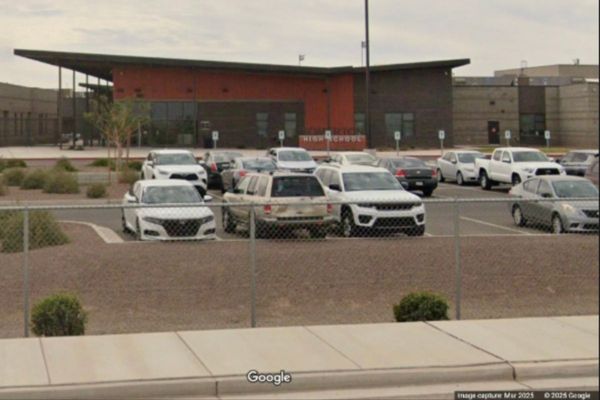
Throughout the last presidential campaign, Donald Trump portrayed himself as the candidate who would bring peace to an unstable world. He promised to use his deal-making experience to negotiate an end to Russia’s invasion of Ukraine and Israel’s war on Gaza, among other global conflicts.
“If Kamala wins, only death and destruction await because she is the candidate of endless wars. I am the candidate of peace,” Trump told a rally in Michigan on 1 November, as he urged Arab and Muslim American voters to choose him over the Democratic candidate, Kamala Harris.
But less than 100 days into his second term, Trump has not only instigated economic and political chaos at home, he is also stoking multiple conflicts abroad. Last month, Trump launched a new US bombing campaign against Houthi rebels in Yemen, who have been disrupting international shipping in the Red Sea. Trump also supported the Israeli prime minister, Benjamin Netanyahu, after he imposed a new siege on Gaza and restarted Israel’s devastating war against the Palestinian territory. And on 28 March, Israel bombed Beirut for the first time since agreeing to a US-brokered ceasefire with the Hezbollah militia in Lebanon, jeopardizing another fragile truce in the region.
Trump’s campaign trail promises of ending the legacy of wars that the US had unleashed in the Middle East after the September 11 attacks resonated with a war-weary American public. But the self-declared “candidate of peace” is sleepwalking the US into multiple new conflicts because of his desire to project strength and to avoid pressuring Netanyahu into ending Israel’s wars, which rely on US weapons and political support.
For years, Trump has mused that he deserves to win the Nobel peace prize for brokering a series of diplomatic deals, known as the Abraham accords, between Israel and several Arab states during his first term as president. In his inaugural address on 20 January, Trump went even further than he had during the campaign in trying to establish himself as a global peacemaker in his second term. “We will measure our success not only by the battles we win but also by the wars that we end – and perhaps most importantly, the wars we never get into,” he said, adding: “My proudest legacy will be that of a peacemaker and unifier.”
But Trump is making little progress toward solving the biggest conflicts he pledged to tackle, partly because he has usually sided with the aggressor. In early March, days after Trump and the Ukrainian leader, Volodymyr Zelenskyy, had a televised shouting match in the White House, the president suspended all US military aid and intelligence sharing with Ukraine. Trump argued he was using the suspension to force Zelenskyy to make concessions that would help the US broker a ceasefire between Russia and Ukraine. But Trump avoided pressuring Vladimir Putin, who had launched Russia’s unprovoked invasion of Ukraine in 2022, to also make concessions.
Trump restored military aid to the Ukrainians after Zelenskyy agreed to a series of US-brokered meetings, but Putin recently dismissed the latest US ceasefire proposals as unacceptable. With little pressure from Trump, Putin is insisting on truce terms that would force Ukraine to agree to demilitarize and pledge never to join Nato and to recognize Russian annexation of occupied territories, including Crimea. The deal would essentially dismantle Ukraine as an independent state.
In the same way, Trump has failed to use US leverage – billions of dollars in US arms shipments – to pressure Netanyahu not to resume Israel’s war on Gaza. In fact, as the Trump administration froze military aid to Ukraine last month, it approved $4bn in new weapons to Israel under the state department’s emergency authority. That meant those arms deals would bypass even a cursory review by members of Congress. The weapons approved by Trump include more than 35,000 US-made 2,000lb “bunker buster” bombs, which often kill and wound civilians indiscriminately when they’re dropped on population centers, as Israel has done repeatedly in its attacks on Gaza.
And while Trump might have visions of securing his Nobel prize for brokering a normalization deal between Israel and Saudi Arabia – an expansion of the Abraham accords that eluded Joe Biden for four years – Trump would first need to stop the bloodshed in Gaza. Like Biden before him, Trump has shown little willingness to exert significant pressure on Netanyahu, who backed out of the US-brokered ceasefire with Hamas so that he could keep his rightwing coalition in power and avoid early parliamentary elections in Israel.
Saudi Arabia’s crown prince and de facto ruler, Mohammed bin Salman, has made clear that he won’t agree to a diplomatic deal with Israel until the Israeli government commits to the establishment of a Palestinian state. Netanyahu, on the other hand, openly boasted last year that he had spent decades of his political career blocking the creation of a Palestinian state. Trump has also failed to expand the 2020 Abraham accords because they were mainly conceived and negotiated by Jared Kushner, the president’s son-in-law and senior adviser during his first term, who has stayed out of the White House this time.
More broadly, as long as the president fails to use the same kind of leverage and political power against Netanyahu that he deployed against Ukraine, his dream of a Nobel prize will remain elusive.
Aside from his failure to stop the wars in Ukraine and Gaza, Trump recently expanded a destructive conflict with the Houthi militia that controls most of Yemen. After Israel invaded Gaza following the October 2023 Hamas attack on southern Israel, the Houthis began firing missiles and drones at cargo vessels crossing the Red Sea. The Houthis pledged to stop disrupting global shipping once Israel ended its war on Gaza – and they did so after Israel and Hamas agreed to a ceasefire in January. But after Israel imposed a new siege on 2 March, banning all food and other aid shipments into Gaza, the Houthis threatened to resume their attacks on Red Sea shipping lanes.
In response, the Trump administration launched a series of US airstrikes on 15 March throughout Yemen, which killed at least 53 people and injured nearly 100. The US attacks on Houthi-controlled parts of Yemen continued over the past three weeks, with no end in sight since Netanyahu shattered the Gaza ceasefire.
Trump is repeating the same mistakes for which he excoriated Biden throughout the presidential campaign. For nearly a year starting in January 2024, Biden had tried – and failed – to bomb the Houthis into submission.
At the start of his own administration’s airstrikes against Yemen last year, reporters in Washington asked Biden if US attacks on Houthi targets were working. His answer perfectly encapsulated the kneejerk, and almost absurd, rationale behind the US’s forever wars. “When you say working, are they stopping the Houthis? No,” Biden said. “Are they going to continue? Yes.”
In an interview with the podcaster Tim Pool during last year’s campaign, Trump decried Biden’s bombing of Yemen as a failure – and he suggested trying to negotiate with the Houthis. “It’s crazy. You can solve problems over a telephone. Instead, they start dropping bombs,” Trump said. “You don’t have to do that. You can talk in such a way where they respect you and they listen to you.”
Now back in power, the candidate of peace has instead decided to drop more US bombs on Yemen.
Mohamad Bazzi is the director of the Hagop Kevorkian Center for Near Eastern Studies and a journalism professor at New York University







